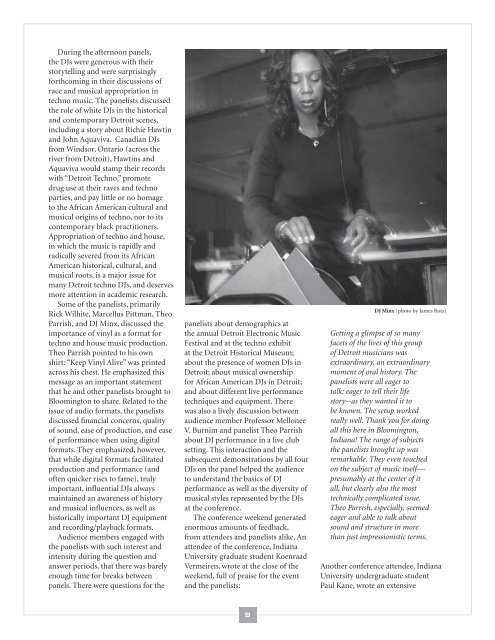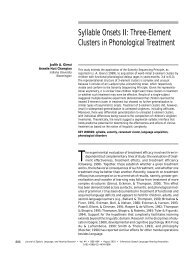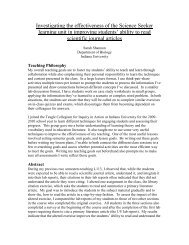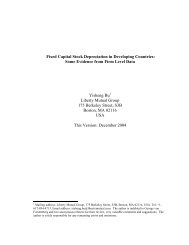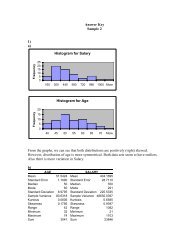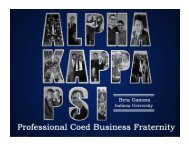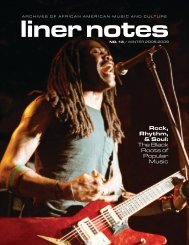Roots of Techno: Black DJs and the Detroit Scene - Indiana University
Roots of Techno: Black DJs and the Detroit Scene - Indiana University
Roots of Techno: Black DJs and the Detroit Scene - Indiana University
Create successful ePaper yourself
Turn your PDF publications into a flip-book with our unique Google optimized e-Paper software.
During <strong>the</strong> afternoon panels,<br />
<strong>the</strong> <strong>DJs</strong> were generous with <strong>the</strong>ir<br />
storytelling <strong>and</strong> were surprisingly<br />
forthcoming in <strong>the</strong>ir discussions <strong>of</strong><br />
race <strong>and</strong> musical appropriation in<br />
techno music. The panelists discussed<br />
<strong>the</strong> role <strong>of</strong> white <strong>DJs</strong> in <strong>the</strong> historical<br />
<strong>and</strong> contemporary <strong>Detroit</strong> scenes,<br />
including a story about Richie Hawtin<br />
<strong>and</strong> John Aquaviva. Canadian <strong>DJs</strong><br />
from Windsor, Ontario (across <strong>the</strong><br />
river from <strong>Detroit</strong>), Hawtins <strong>and</strong><br />
Aquaviva would stamp <strong>the</strong>ir records<br />
with “<strong>Detroit</strong> <strong>Techno</strong>,” promote<br />
drug use at <strong>the</strong>ir raves <strong>and</strong> techno<br />
parties, <strong>and</strong> pay little or no homage<br />
to <strong>the</strong> African American cultural <strong>and</strong><br />
musical origins <strong>of</strong> techno, nor to its<br />
contemporary black practitioners.<br />
Appropriation <strong>of</strong> techno <strong>and</strong> house,<br />
in which <strong>the</strong> music is rapidly <strong>and</strong><br />
radically severed from its African<br />
American historical, cultural, <strong>and</strong><br />
musical roots, is a major issue for<br />
many <strong>Detroit</strong> techno <strong>DJs</strong>, <strong>and</strong> deserves<br />
more attention in academic research.<br />
Some <strong>of</strong> <strong>the</strong> panelists, primarily<br />
Rick Wilhite, Marcellus Pittman, Theo<br />
Parrish, <strong>and</strong> DJ Minx, discussed <strong>the</strong><br />
importance <strong>of</strong> vinyl as a format for<br />
techno <strong>and</strong> house music production.<br />
Theo Parrish pointed to his own<br />
shirt: “Keep Vinyl Alive” was printed<br />
across his chest. He emphasized this<br />
message as an important statement<br />
that he <strong>and</strong> o<strong>the</strong>r panelists brought to<br />
Bloomington to share. Related to <strong>the</strong><br />
issue <strong>of</strong> audio formats, <strong>the</strong> panelists<br />
discussed financial concerns, quality<br />
<strong>of</strong> sound, ease <strong>of</strong> production, <strong>and</strong> ease<br />
<strong>of</strong> performance when using digital<br />
formats. They emphasized, however,<br />
that while digital formats facilitated<br />
production <strong>and</strong> performance (<strong>and</strong><br />
<strong>of</strong>ten quicker rises to fame), truly<br />
important, influential <strong>DJs</strong> always<br />
maintained an awareness <strong>of</strong> history<br />
<strong>and</strong> musical influences, as well as<br />
historically important DJ equipment<br />
<strong>and</strong> recording/playback formats.<br />
Audience members engaged with<br />
<strong>the</strong> panelists with such interest <strong>and</strong><br />
intensity during <strong>the</strong> question <strong>and</strong><br />
answer periods, that <strong>the</strong>re was barely<br />
enough time for breaks between<br />
panels. There were questions for <strong>the</strong><br />
panelists about demographics at<br />
<strong>the</strong> annual <strong>Detroit</strong> Electronic Music<br />
Festival <strong>and</strong> at <strong>the</strong> techno exhibit<br />
at <strong>the</strong> <strong>Detroit</strong> Historical Museum;<br />
about <strong>the</strong> presence <strong>of</strong> women <strong>DJs</strong> in<br />
<strong>Detroit</strong>; about musical ownership<br />
for African American <strong>DJs</strong> in <strong>Detroit</strong>;<br />
<strong>and</strong> about different live performance<br />
techniques <strong>and</strong> equipment. There<br />
was also a lively discussion between<br />
audience member Pr<strong>of</strong>essor Mellonee<br />
V. Burnim <strong>and</strong> panelist Theo Parrish<br />
about DJ performance in a live club<br />
setting. This interaction <strong>and</strong> <strong>the</strong><br />
subsequent demonstrations by all four<br />
<strong>DJs</strong> on <strong>the</strong> panel helped <strong>the</strong> audience<br />
to underst<strong>and</strong> <strong>the</strong> basics <strong>of</strong> DJ<br />
performance as well as <strong>the</strong> diversity <strong>of</strong><br />
musical styles represented by <strong>the</strong> <strong>DJs</strong><br />
at <strong>the</strong> conference.<br />
The conference weekend generated<br />
enormous amounts <strong>of</strong> feedback,<br />
from attendees <strong>and</strong> panelists alike. An<br />
attendee <strong>of</strong> <strong>the</strong> conference, <strong>Indiana</strong><br />
<strong>University</strong> graduate student Koenraad<br />
Vermeiren, wrote at <strong>the</strong> close <strong>of</strong> <strong>the</strong><br />
weekend, full <strong>of</strong> praise for <strong>the</strong> event<br />
<strong>and</strong> <strong>the</strong> panelists:<br />
DJ Minx (photo by James Rotz)<br />
Getting a glimpse <strong>of</strong> so many<br />
facets <strong>of</strong> <strong>the</strong> lives <strong>of</strong> this group<br />
<strong>of</strong> <strong>Detroit</strong> musicians was<br />
extraordinary, an extraordinary<br />
moment <strong>of</strong> oral history. The<br />
panelists were all eager to<br />
talk: eager to tell <strong>the</strong>ir life<br />
story--as <strong>the</strong>y wanted it to<br />
be known. The setup worked<br />
really well. Thank you for doing<br />
all this here in Bloomington,<br />
<strong>Indiana</strong>! The range <strong>of</strong> subjects<br />
<strong>the</strong> panelists brought up was<br />
remarkable. They even touched<br />
on <strong>the</strong> subject <strong>of</strong> music itself—<br />
presumably at <strong>the</strong> center <strong>of</strong> it<br />
all, but clearly also <strong>the</strong> most<br />
technically complicated issue.<br />
Theo Parrish, especially, seemed<br />
eager <strong>and</strong> able to talk about<br />
sound <strong>and</strong> structure in more<br />
than just impressionistic terms.<br />
Ano<strong>the</strong>r conference attendee, <strong>Indiana</strong><br />
<strong>University</strong> undergraduate student<br />
Paul Kane, wrote an extensive


